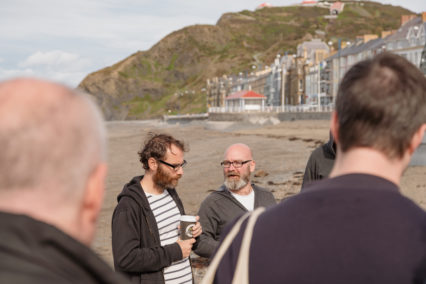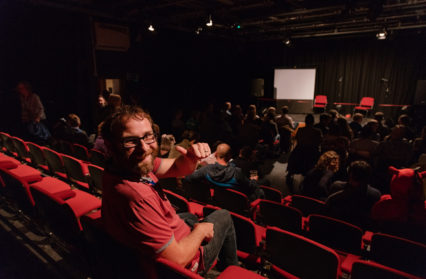Wales Arts Review talks to Henry Widdicombe, founder of the Machynlleth Comedy Festival, and now one of the driving forces behind the new comedy festival in Aberystwyth which kicks off its second year this weekend.
Why choose Aberystwyth as a location for a new comedy festival?
We realised Machynlleth Comedy Festival was reaching its natural size and wanted to establish another event by the coast in Wales. We looked at a few different locations but quickly realised that, despite being geographically close to Machynlleth, Aberystwyth had so many qualities that would make it a distinct comedy festival.
It was always imperative that we create an event with its own personality and Aberystwyth has that through the university, the promenade, the direct train from Birmingham… just a few of the reasons why it was such an obvious choice.

How successful was the inaugural festival last year? Have you made any changes for 2019?
Our aim is always to build an event slowly and organically and for it to find its own audience. So, the first year couldn’t have gone better. We experienced higher than projected sales across the weekend but more importantly, we presented a progressive comedy programme that audiences engaged with. We’re now tweaking things, and have grown the festival ever so slightly for this, its second year. But we are focused on following a longer-term plan for growth, and not forcing the festival to become larger than it needs to be.
What do you hope to achieve with the Aberystwyth Comedy Festival?
Our aim is to create a counterpoint to the Machynlleth Comedy Festival, which is largely about the creation and development of new work in the Spring. Aberystwyth Comedy Festival will be at the other end of the summer season, post-Edinburgh Fringe, where completed works will be staged. The idea is that Wales will then have two of the best comedy festival in the UK, showcasing what are the most interesting contemporary comic voices at different stages of the creative process.
What are your influences/ideas/models when constructing a festival of this kind?
Machynlleth Comedy Festival was largely influenced by my own experiences of performing at comedy festivals. It’s certainly driven by a desire to do things better, with the artist at the forefront of every decision made. Aberystwyth, if anything, is influenced by ten years’ worth of lessons from Machynlleth. Both events have been influenced more by small music and arts festivals than comedy festivals and that’s what makes them stand-out. Stewart Lee once likened the vibe of our events to that of the short-lived 80s Cornish festival, Elephant Fayre, near where I grew up. So who knows, perhaps that’s where it’s all come from.
What drives you to provide a platform for comedy like this? Tell us a bit about your comedy background and how you came to promoting/events.
I went into stand-up comedy as a performer in 2008 and quickly realised two things. Firstly, in order to have a chance at success, moving to London and performing at the Edinburgh Fringe Festival on an annual basis were imperative, and secondly that the standard of gigs and festivals out there in the UK wasn’t consistently high. As a result, I decided to start running my own gigs in Wales where I lived, and it developed from there. The main thing we’ve concentrated on is putting the performer before anything else, and making decisions based on what is best for them. I believe this comes entirely from my years doing stand-up which were littered with gigs where you’d turn up to an inappropriate space for a performance. Nobody wins in that situation. We were basically driven to do it better.
The explosion of festivals in the last two decades has changed the way we experience art – what is your impression of this?
The festival scene has always been developing and evolving, and the way we experience art has as well. A lot has happened to the way we consume entertainment in the last two decades, and how we find out about things that might interest us. I also think there is such a huge definition of what can constitute, or be labelled, a festival. We try to concentrate on what we’re doing and how we see things, and attract people who like to experience art in the way that we organise it.
How about the current state of comedy in Wales. Is it healthy?
Like everything in Wales you have to consider the size and geographic make-up of the country, and when you do, you can argue that it punches way above its weight comedically.
I recently heard someone talking about the lack of top bankable names appearing at regular comedy nights in Wales and how it’s a bit of a “same old faces” mentality which affects audience numbers. Is this true, to what extent and are festivals a way of counteracting this – are they a way to try and get Welsh live comedy back on its feet?
I can only talk about our approach to this but, for example, we run five monthly comedy clubs across Wales that will always have what we consider to be top names, and in addition to that, we also have a two year, no repeat appearance policy at our clubs.
This may be in reference to the open mic, or semi-professional scene, which is the life-blood of bringing through new domestic talent. These clubs, by their very design, are reliant on the local scenes to populate bills, and offer invaluable stage time for newer acts to develop. You cannot generate new talent domestically without every section of the comedy ladder being represented – from open mic nights, to the local paid nights, to professional bills where Welsh acts can get their first paid spots alongside peers from other nations, to the festivals where acts can deliver hour shows that they’ve been curating over many years.
The Welsh comedy scene is in a constant state of flux in regard to who’s performing, whether they’re still based in Wales, what new voices are coming through, but that is what a healthy comedy scene looks like.
Should more risks be taken in Welsh comedy?
I don’t believe it’s about a collective of geographically linked comedians taking more risks. Each individual has their own comic voice and will, as a result, be perceived to be risky or not. If you take someone like Jordan Brookes, winner of the 2019 Edinburgh Comedy Award, he spent the bulk of his time developing on the Cardiff scene and is one of the most alternative voices of his generation.
His act looks nothing like what people expect stand-up comedy to be, so is taking risks in that sense, but he consistently makes sold out rooms laugh. The tone of anyone’s stand-up voice should be down to that individual and what they’re looking to achieve. I’m not sure anyone should make their act more risky in order for a particular scene to benefit in some way.
Who were your comedy influences growing up and who really stand out to you at the moment?
I grew up in the 90s on shows like The Fast Show, Bottom and Newman and Baddiel. I was also hugely into Rob Newman, Stewart Lee and the films of Steve Martin. It really informed my tastes for more alternative comedy and stuff that’s memorable and interesting. There are so many strong, distinctive voices around at the moment. For me, James Acaster is the best comedian the UK has produced in some time, a truly world class comedian.
From Wales you have the likes of Kiri Pritchard-McLean, Gein’s Family Gift Shop (who are also part of Tarot) and Jordan Brookes. In addition, Jess Fostekew, Jen Brister, Sara Barron, Lou Sanders and Sean Morley all had incredible shows at Edinburgh this year. And an act who had a huge impact on me is Australian comic Sam Campbell who couldn’t be more up my street.
Where would you like the Welsh comedy scene to be in 10 years’ time?
Given that we started running festivals and events is Wales because we didn’t like that comedy was so centred around London and Edinburgh, we would love to see more acts emerge from the Welsh scene due to increased quality opportunities on their doorstep. We wanted to help challenge the traditional routes into comedy of Oxbridge/Footlights and the Edinburgh Fringe and offer support to acts who perhaps felt they couldn’t get into comedy because of certain barriers.
By generating more opportunities within Wales, our overall aim is for the country to produce more artists who know they can do this, and have institutions behind them that believe in what they’re doing and offer them stage time as a result.
For more information about this year’s festival you can visit their website here.













